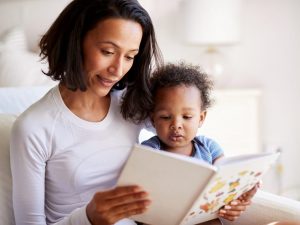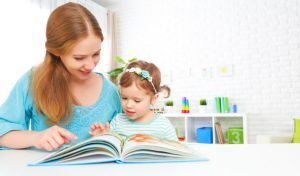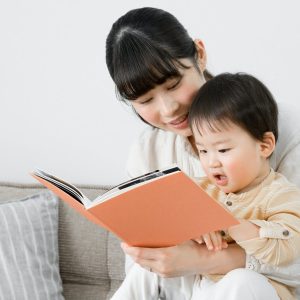
Parents play a critical role in a child’s language development. Studies have shown that children who are read to and spoken with a great deal during early childhood will have larger vocabularies and better grammar than those who aren’t. Here are some ways to expand your little one’s language development.
Read With Your Little Ones

It’s never too early to read to your little bundle of joy. Parents can start with simple board books and graduate to picture books and longer stories as their child gets older. Let your child hold the book and turn the pages. This will help your little one learn how a book works. Let your little one take over and read to you, in whatever way they can. Your tot may want to point to the pictures and have you say what they are, talking about the pictures that are in the book will aid in enhancing your little one’s language skills. “The doggy in the picture is getting tired. He is in his bed. He is going night-night. Night, night, doggy.” Talking about the pictures helps children develop a better understanding of what is happening in the story. Sometimes, instead of reading the actual words in the book, you can simply talk about the pictures on each page.
Talk About Anything & Everything

Narrate the day as it evolves. Tell your little one, for instance, “Now we’re going to go for a walk in the park. Are you excited?.” Research has found that the more parents talk with their children, the larger vocabularies those children develop. These children also use more advanced sentence structures. So chatting with your toddler whether in the car, at the playground or during bath time is very important.
Never Criticize Your Child’s Articulation Or Speech Patterns

There is no need to correct your child. Simply repeat the correct pronunciation. If you child says, “Gamma”, you may respond by saying, “I see that Grandma gave you a cookie, yum yum!” to give your child a chance to hear how the word sounds. Correcting your child can make him less likely to try saying new words. Instead, repeat his statements back to him with the correct pronunciation or word usage and be sure to give your child lots of praise for his efforts.
Storytime All The Time

Instead of reading a book, tell your child a story. Little ones still gain important literacy skills by listening. They learn new words. They also learn how a story unfolds in a sequence (beginning, middle, and end). If your little one shows no interest in the storybook you’re reading, then place the book down and try making up a story instead, paired with facial expressions and some performing arts. Make up elaborate stories with characters, conflict, adventure, and a happy ending. Be sure that the stories fit your child’s interests and aren’t too scary for their liking.
Go On Field Trips

A trip to the zoo, the aquarium, or a children’s museum will open up a whole new world for your child. As an added bonus, they’ll want to learn the names of all those fascinating creatures and fun activities they’ve experienced. When you’re out with your little one, take the chance to read the world around you to your tot. Point out stop signs, open/closed signs, your street sign. Let your little one play with and read all kinds of written material, be it magazines, newspapers, catalogues or even take-out menus.
Treat Ear Infections Thoroughly

Children in group child-care situations are more prone to ear infections, which can put them at risk for hearing loss and, consequently, language delays. If your paediatrician prescribes an antibiotic to treat an infection, make sure your child takes the correct dosage each day and uses it for the full prescribed time. When your child finishes the prescription, schedule a follow-up visit with your paediatrician to make sure the infection has cleared.
Enjoy Music Together

Young children love music and movement. When they listen to lively songs, like ‘Old McDonald Had a Farm,’ they learn about the world around them and the rhythm of language. Music plays a very important part of learning both our native language, as well as additional ones. As children, we can imitate the rhythm and musical structure of our mother tongue long before we can say the words. Most of us can remember several songs and nursery rhymes we learned as children. Music helps us retain words and expressions much more effectively. The rhythm of the music, as well as the repetitive patterns within the song, help us memorize words. Bilingual children, in particular, can benefit from singing songs in their second language. Even if most of the words are unfamiliar at first, mimicking the words in a song can help children practice producing sounds in the new language. Eventually, the sounds give way to actual understanding as the song is practiced over and over again.
Use Television & Computers Sparingly

Studies report a link between TV and language development in babies. The more time babies spend watching television, the more slowly they learn to talk. It is recommended that children younger than 2 not watch television at all and that children 2 and older view no more than two hours of quality programming a day. While some educational programs can be beneficial to kids, mind-numbing TV shows don’t interact with or respond to children, which are the two catalysts kids need to learn language. Computer games are interactive, but they aren’t responsive to a child’s ideas.
Pay Close Attention To The Books You Pick For Your Tots

Choose books with stories that repeat words or phrases. Children learn new words and pronunciations through repetition. Select picture books with strong storylines and character development, a book with a straightforward story employing words that will be familiar from everyday use. Some publishers produce books, generally called “easy readers,” which independent readers often enjoy. A lot of informational books have been published for younger children. These non-fiction books encourage children to read about topics that interest them and to satisfy their curiosity about complex subjects.
